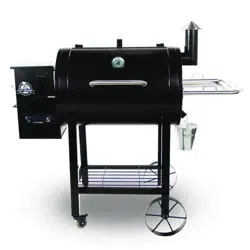Loading ...
Loading ...
Loading ...

ENGLISH
13
Temperature readouts on the control board may not exactly match the thermometer. All temperatures listed below
are approximate and are affected by the following factors: outside ambient temperature, the amount and direction of
wind, the quality of pellet fuel being used, the lid being opened, and the quantity of food being cooked.
•
205260° / 401500°
This range is best used to sear and grill at a high heat. Use in tandem with the flame broiler (slide plate) for indirect or
direct flame cooking. With the
flame broiler open
, direct flame is used to create those “blue” steaks, as well as flame-
kissed vegetables, garlic toast or s’mores! When the
flame broiler is closed
, the air circulates around the barrel, resulting
in convection heat. High temperature is also used to preheat your grill, burn-off the cooking grids, and to achieve high heat
in extreme cold weather conditions.
•
135180° / 275356°
This range is best for baking, roasting, and finishing off that slow smoked creation. Cooking at these temperatures will
greatly reduce the chances of a grease flare-up. Ensure that the flame broiler slider in the closed position, covering the
slotted openings. Great range for cooking anything wrapped in bacon, or where you want versatility with control.
•
80125° / 176257°
This range is used to slow roast, increase smoky flavor, and to keep foods warm. Infuse more smoke flavor and keep your
meats juicy by cooking longer at a lower temperature (also known as
low and slow
). Recommended for the big turkey at
Thanksgiving, juicy ham at Easter, or the huge holiday feast.
Smoking is a variation on true barbecuing and is truly the main advantage of grilling on a wood pellet grill.
Hot smoking
,
another name for
low and slow
cooking, is generally done between 80-125C / 176-257F. Hot smoking works best when
longer cooking time is required, such as large cuts of meats, fish, or poultry.
TIP: To intensify that savory flavor, switch to (low) temperature range immediately after putting your food
on the grill. This allows the smoke to penetrate the meats.
The key is to experiment with the length of time you allow for smoking, before the meal is finished cooking. Some outdoor chefs
prefer to smoke at the end of a cook, allowing the food to keep warm until ready to serve. Practice makes perfect!
•
Located inside the main barrel, on the left wall, is the temperature probe. It is a small, vertical piece of stainless steel. The
temperature probe measures the internal temperature of the unit. When the temperature is adjusted on the Control Board, the
temperature probe will read the actual temperature inside the unit and adjust to the desired temperature.
IMPORTANT: The temperature of your unit is highly affected by ambient outdoor weather, quality of pellets used,
flavor of pellets, and the quantity of food being cooked.
•
The meat probe measures the internal temperature of your meat in the grill, similar to your indoor oven. Plug-in the meat
probe adapter to the meat probe connection port on the Control Board and insert the stainless steel meat probe into the
thickest portion of your meat and the temperature will be displayed on the control board. To ensure the meat probe is
connected properly to the connection port, feel and hear it snap into place.
NOTE: When placing the meat probe into your meat, ensure the meat probe and meat probe wires avoid direct contact
with flame or excess heat. This can result in damage to your meat probe. Run the excess wire out the rear exhaust holes
of the main grill or the top of the main grill (near the grill lid hinge). When not in use, disconnect from the meat probe
connection port and place aside to keep protected and clean.
Loading ...
Loading ...
Loading ...
